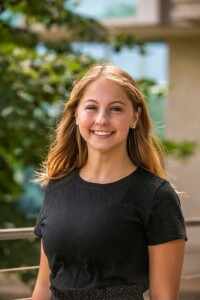
Sarah Driscoll, a VINSE Associate Tech Crew member and junior in the Department of Chemical and Biomolecular Engineering, is the second place national winner in the 2023 IGNITE Off! Competition sponsored by the U.S. Department of Energy, Office of Science, Office of Workforce Development for Teachers and Scientists (WDTS) and hosted by the Oak Ridge Institute for Science and Education (ORISE).
The annual Ignite Off! competition showcases the talents of interns participating in the Summer 2023 Community College Internships (CCI), Science Undergraduate Laboratory Internships (SULI) and Visiting Faculty–Student programs from participating laboratories as they share their research through Ignite Talks.
Driscoll was a SULI summer intern at the Stanford Linear Accelerator Center working in the National Accelerator Laboratory at the Stanford Synchrotron Radiation Lightsource facility. Synchrotrons shoot X-rays at samples to understand their composition. One of the ways they do this is by capturing fluoresced photons from the sample. Setting up the detector to detect these photons at specific energies is a time-consuming process that is typically done with bulk materials that fluoresce too much or user samples where expected fluorescence is unknown.
Driscoll’s project—“X-ray Absorption Spectroscopy: Fluorescence Detectors”—involved improving fluorescent detector setup times by making standards with known absorption characteristics to calibrate the detector before use. Driscoll won the local semi-final round at her host laboratory and advanced to the national finals. She won gift cards at each round.
“To explain your research project required lots of time to perfect the presentation,” Driscoll said. Competitors had five minutes to present their project, using 20 picture-centric slides that automatically advance every 15 seconds. The also had access to an ORISE professional development course that teaches the process for developing an Ignite talk.
On campus, Driscoll works in the Vanderbilt Institute of Nanoscale Science and Engineering’s (VINSE) cleanroom as an associate tech crew member where she helps grow graphene and assists with tasks critical for cleanroom operation. “I also am an undergraduate researcher the Kidambi Lab in the Department of Chemical Engineering where I’m working to find a scalable fabrication method of 2D materials for applications in energy and the environment field,” she said. “All my research endeavors as an undergraduate have led to the decision to pursue graduate school.”